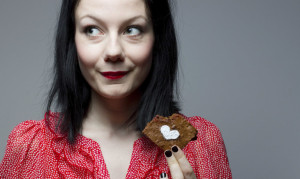
Our brains are wired to pay more attention to things that have previously brought us pleasure—a bias that may explain why it’s so hard to break bad habits or stick to New Year’s resolutions.
Neuroscientists demonstrated that when people see something associated with a past reward, their brain flushes with the neurotransmitter chemical dopamine—even if they aren’t expecting a reward and even if they don’t realize they’re paying that thing any attention. The results suggest we don’t have as much self-control as we might think.
“We don’t have complete control over what we pay attention to,” says senior author Susan M. Courtney, professor of psychological and brain sciences at Johns Hopkins University. “We don’t realize our past experience biases our attention to certain things.”
This could be why it’s so hard to break a pleasurable addiction and why dieters keep thinking about fattening food when they’re trying to eat better.
“I could choose healthy food or unhealthy food, but my attention keeps being drawn to fettuccini alfredo,” Courtney says. “What we tend to look at, think about, and pay attention to is whatever we’ve done in the past that was rewarded.”
For the study, published in Current Biology, researchers asked 20 participants to find red and green objects on a computer screen filled with different colored objects. Participants got $1.50 for finding red objects and 25 cents for green ones. The next day, while the subjects had brain scans, researchers asked them to find certain shapes on the screen.
Color no longer mattered and there was no reward involved. But when a red object appeared, participants automatically focused on it and a particular part of their brain involved in attention filled with dopamine, a brain chemical released when we receive rewards and anticipate or experience pleasure.
Participants found the shapes they were told to find; they were just slower doing it than if the previously rewarded “red” wasn’t distracting them.
“What’s surprising here is people are not getting rewarded and not expecting a reward,” Courtney says. “There’s something about past reward association that’s still causing a dopamine release. That stimulus has become incorporated into the reward system.”
Some of the test subjects were more distracted by the previously rewarded red than others. Those who were most distracted had the most elevated dopamine levels while those who were better able to focus on the task at hand appeared to have suppressed any release of dopamine.
Generally speaking, distractions tended to be bigger for people prone to addiction and smaller for people who are successful abstainers and people who are depressed and don’t care about rewards, Courtney says.
The findings suggest there could be a way to pharmaceutically curb these neurochemical distractions—a potential benefit for addicts, dieters and those with other problem behaviors.
One of the coauthors of the paper is Steven Yantis, a professor of psychological and brain sciences who died of cancer in 2014. When Yantis died, Courtney and students in the Yantis lab felt strongly that his work had to continue.
Courtney, who Yantis recruited to Johns Hopkins, took on his research program and “adopted” his students into her lab. Over the past year, their combined teams have worked to finish Yantis’ final projects and launch new ones that combine his ideas with Courtney’s. This paper’s lead author, Brian Anderson, was a graduate student in the Yantis lab and now works for Courtney as a postdoctoral researcher.
“This is the kind of challenge that defined the career of Steven Yantis,” says Anderson, who stayed at Johns Hopkins for an extra year to finish the study and related projects. “A brilliant experimentalist with interests in cognitive neuroscience, Steve had a real knack for elegantly isolating a cognitive process in the brain. This project is a reflection of who he was as a scientist and the impact that had on me through his mentorship. That legacy really motivated all of us to see this project through.”
The National Institutes of Health supported the work.
Source: Johns Hopkins University and Futurity.org








